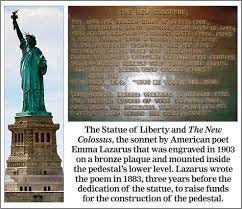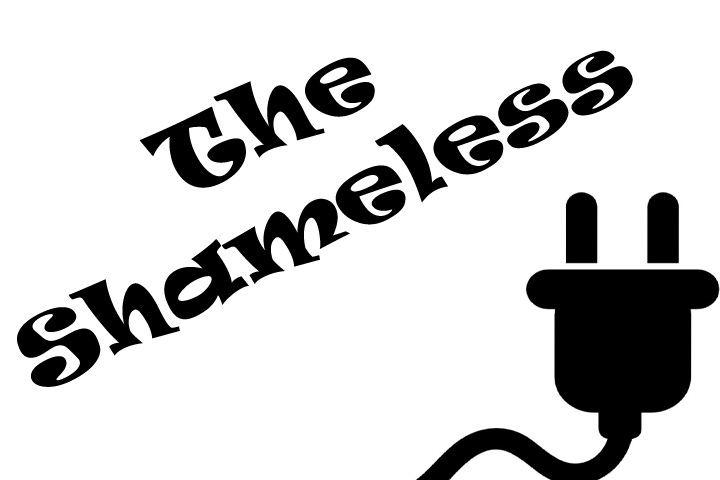"Give me your tired, your poor, your huddled masses yearning to breathe free..."
But only if they are straight Christians from northern and western Europe.
Issue #325 OpEd May 22, 2023
Immigration is once again a very hot topic in the United States, especially because the Democrats are in the White House.
Just before every election, the Republicans claim that "caravans of immigrants" are illegally invading America from the southern border. One of Trump’s first acts as president was to institute a “Muslim ban,” no matter the country of origin.
They're coming here to take your jobs, rob your homes, flood your communities with drugs, replace your white, Christian society with socialism, communism, and Islam, and eventually become Democratic voters. And...they're BROWN and don’t speak English!
After the recent end of the Trump era "Title 42" act that limited immigration at the southern border supposedly due to concerns about the spread of Covid-19, the Republicans announced that there would be a huge surge of immigrants trying to enter the country. However, just the opposite happened: the number of people trying to enter the U.S. through Mexico, for example, actually went down.
In the mid-to-late 1800s, immigrants from many European countries fled to America, primarily to flee from hunger and political strife. Every new wave of immigrants was met with derision and discrimination.
Just as today, most immigrants worked the worst jobs or started their own businesses, often living in the worst housing situations while employing everyone in their families.
The reason why policemen are often pictured as stereotypical Irishmen is that for a period of time during the 19th century, being a policeman on the East Coast (particularly in Boston and New York) was a low-level and dishonorable profession, and only Irishmen were hired as police officers.
Throughout American history, various laws have been passed to restrict or eliminate immigration, particularly from certain countries and regions. One of the most notable examples is the Chinese Exclusion Act of 1882, which prohibited Chinese laborers from entering the United States for 10 years and prevented Chinese immigrants from becoming citizens.
Other laws, such as the Immigration Act of 1924, established quotas on immigration based on national origin, with the aim of restricting immigration from Southern and Eastern Europe.
In 1952, the Walter–McCarran Act finally nullified all federal anti-Asian exclusion laws and allowed for the naturalization of all Asians.
Other immigration quotas still remained in place.
Finally, the Immigration and Nationality Act of 1965 (also known as the Hart-Celler Act) abolished the national origins quota system that had been in place since 1924. The new law focused on immigrants' skills and family relationships with citizens or residents of the U.S. rather than their country of origin.
The act was a response to changing social attitudes and the civil rights movement, which challenged the discriminatory policies of the past.
The 1965 law opened the doors to millions of immigrants from Asia, Africa, the Middle East, and Latin America, and helped shape modern-day America into a more diverse and multicultural society.
And a more diverse and multicultural society is exactly what white nationalists in America are so afraid of.
Please make sure to view and act on the important information at the end of this article to help support “We Are Speaking.” Thank you!
In the mid-1800s, new waves of immigration began as Europe experienced economic and political upheaval. Millions of people from Ireland, Germany, Italy, and other countries came to America in search of a better life. They faced discrimination and prejudice from those who believed that they were taking jobs away from American-born citizens.
However, several generations later, many of the descendants of those immigrants are now fighting against the immigration of people who are coming here for the same reasons but from different countries than their ancestors.
In 1886, the Statue of Liberty was unveiled on Liberty Island in New York Harbor. The statue, a gift from France to America, quickly became a symbol of freedom and opportunity for immigrants. The statue's inscription, "Give me your tired, your poor, your huddled masses yearning to breathe free," became a rallying cry for those seeking a better life in America.
However, women, Blacks, and other non-whites were excluded from participating in the unveiling ceremony.
The poem on the Statue of Liberty, titled "The New Colossus," was written by Emma Lazarus (1849 - 1887) in 1883. The poem was not originally part of the statue, but it was added in 1903 as a tribute to Lazarus and her work on behalf of immigrants. The poem speaks to the idea of America as a nation of immigrants and a beacon of hope for those seeking a better life.
As a wealthy socialist, feminist, pro-refugee, and pluralist Jew, Emma Lazarus was exactly the kind of person today's Republicans rail against.
The New Colossus
Not like the brazen giant of Greek fame,
With conquering limbs astride from land to land;
Here at our sea-washed, sunset gates shall stand
A mighty woman with a torch, whose flame
Is the imprisoned lightning, and her name
Mother of Exiles. From her beacon-hand
Glows worldwide welcome; her mild eyes command
The air-bridged harbor that twin cities frame.
"Keep, ancient lands, your storied pomp!" cries she
With silent lips. "Give me your tired, your poor,
Your huddled masses yearning to breathe free,
The wretched refuse of your teeming shore.
Send these, the homeless, tempest-tost to me,
I lift my lamp beside the golden door!"
Back in the 1980s, the 40th American President, Republican Ronald Reagan, had quite a different take on immigration. He emphasized that the United States is a nation of immigrants and that its strength comes from its capacity to welcome those from other lands.
He also acknowledged the need for an immigration policy that was effective and orderly but also reflects America's checkered tradition of accepting foreigners, and proposed eight principles for immigration policy.
Reagan desired that America's immigration policy should include the need for legal authority to control immigration, recognize the benefits of Mexicans obtaining employment in the United States, and employ the fair distribution of impacts of the national immigration policy.
Reagan emphasized the need for international cooperation to help reduce the motivations for illegal immigration.
Most importantly, Reagan expressed his belief in the idea of amnesty for those who have put down roots and lived in the US, even though they may have entered illegally, like today's "Dreamers" who were brought here at a very young age by their parents.
Ronald Reagan most probably would not be welcome in today's Republican Party.
Today, immigration remains a contentious issue in American politics. Conservatives argue that ("Brown" and “Black”) immigrants take jobs away from American-born citizens and contribute to crime and other social problems.
Liberals believe that all immigrants bring vitality and diversity to the country and that America's strength lies in its ability to welcome newcomers from around the world.
Let us know your thoughts about immigration today in the Substack Notes feature.
You can always leave any questions in the comments or email us.
This article is free to access for 7 days after publication. Please consider becoming a paid subscriber for $5/month or less to access all of the articles and other benefits.
This is your chance to support everything Keith and Pam do. We appreciate you!
Purchase and download your copy of the “Branding And Marketing For The Rest Of Us” eBook for Independent Authors and Creative and Solo Professionals and other valuable eBooks.
Enroll in one of the 6-course bundles designed especially for you: “Author and Book Marketing” and/or “Essential Creative Marketing.”
Purchase your copies of “Detroit Stories Quarterly” issues.
What else do Keith and Pam do?
Where else can you find us?
Click the link below to learn everything you need to know and review everything we offer for independent writers and creative and solo professionals.









A most beautiful poem which I didn't know. But of course, an artist can see beyond him/herself, and exactly there lies the problem with anyone opposed to diversity: they cannot admit that there is any human worth beyond themselves as individuals and, therefore, there is nothing to concede or condescend to, less to leave alone, and much less aid or help succeed.
I am reminded, without proper detail, mind you, of a quote about education, in which the author expresses dismay and a lack of sleep, thinking that the cure for cancer could be latent, but inaccessible, in the mind of a child laborer at a remote mine.
Thank you.